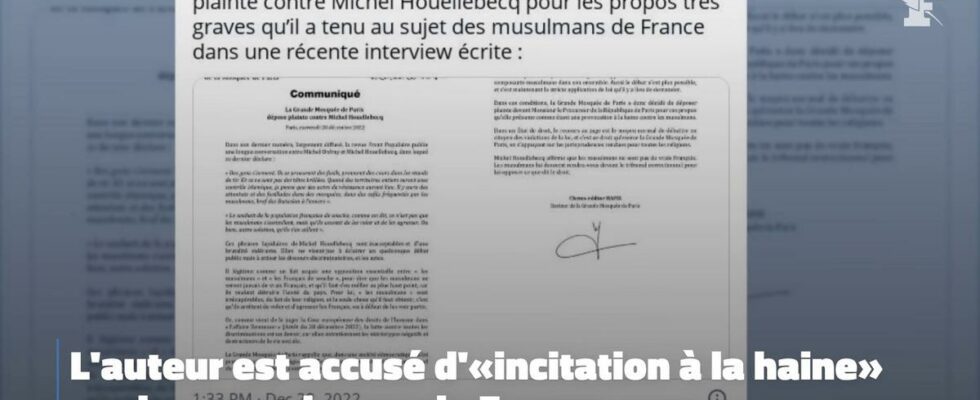After a meeting with the writer, Chems-Eddine Hafiz suspends his proceedings against the writer.
This time, the intellectual controversy will not be settled in court. After a meeting with Michel Houellebecq, the rector of the Mosque of Paris abandons the legal proceedings he intended to initiate against the writer.
Chems-Eddine Hafiz had filed a complaint, Wednesday, December 28, against the author of Submission, for “ incitement to hatred against Muslims “. The remarks in question had been made in the review by Michel Onfray, Popular Front, which gave an account, over forty-five pages, of a conversation between the writer and the philosopher. Two excerpts taken from a long reasoning were incriminated. “ When entire territories are under Islamic control, I think that acts of resistance will take place, declared in particular Houellebecq. There will be attacks in front of mosques, in cafes frequented by Muslims, in short Bataclan upside down “. A little further, the writer asserted: The desire of the native French population is not for Muslims to assimilate, but for them to stop robbing and attacking them… »
Read alsoThe rector of the Paris Mosque: “Why I agreed to meet Michel Houellebecq”
Michel Houellebecq and Chems-Eddine Hafiz met Thursday morning at the initiative of the Chief Rabbi of France, Haïm Korsia. The meeting could have taken place at the Institut de France, but the constraints of the writer’s schedule, who is beginning the shooting of a film by Guillaume Nicloux in Guadeloupe, rushed things. At 9 a.m., the two religious leaders and the most widely read contemporary French author in the world therefore met over coffee. Chems-Eddine Hafiz explained to Michel Houellebecq the great emotion aroused by his remarks. “ If we follow the words of Michel Houellebecq to the letter, I myself am a thief, he explains. I told him he should never have essentialized Muslims by pitting them against the “native” French “.
SEE ALSO – The 10 dates that marked the life of Michel Houellebecq
“Common points”
Michel Houellebecq made a point of restoring his remarks in their context, by specifying that they had been held in a long discussion of six hours, and recognized that “ the relevant paragraphs are ambiguous “. The writer has undertaken to specify them in a future book which will bring together his entire conversation with Michel Onfray published in Front Populaire. Michel Houellebecq entrusted the explained paragraphs to the Figaro, which reproduces them in their entirety on its website. “ I do not believe, for my part, that the conditions are currently met (concerning the civil war, editor’s note). First of all, the police should effectively no longer be able to enter certain neighborhoods; this is not the case: they sometimes have trouble, they have to deploy great means, but they succeed. Then the army itself should no longer be able to enter it; and that seems improbable to me at the moment. “, details the author. Regarding the second incriminated passage, he adds in particular: The stories of the veil, the burkini, halal food etc., the French will not care at all as soon as they no longer perceive Muslims as a threat to their security. What they are asking for, and even demanding, is that foreign criminals be expelled, and in general that justice be harsher with petty offenders. Much more severe. »
Read alsoControversy with the rector of the Paris mosque: the passages that Michel Houellebecq chose to modify
Rabbi Korsia came away from the interview with the satisfaction of having avoided an unnecessary and damaging trial for all parties. ” Houellebecq is an immense writer, an immense thinker “, he adds. The latter entrusts the Figaro that it is “ sincerely relieved and happy with this outcome » and to have been able « make his point clear which correspond more now to what he wanted to express. And Michel Houellebecq concludes: “This kind of debate should not be settled in court. Especially since in the worst case, the trial would have taken place during the debate on euthanasia. However, on this subject, I have a lot in common with the rector and religious leaders in general “.
SEE ALSO – Mila meets the rector of the great mosque of Paris Chems-Eddine Hafiz
